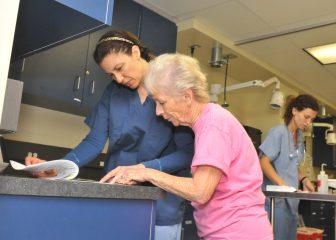Aftercare
Complications
Fortunately, the complication rate from spay/neuter surgery is very low. However, should there be a problem with an animal after surgery, please contact Luke and Lily Lerner Spay/Neuter Clinic. Medical assistance is available 24 hours a day by calling the Foster Hospital for Small Animals emergency service at 508-839-5395.
Any complications that result due to surgery or anesthesia will be taken care of at our expense if the animal is brought back to our hospital. However, we are not responsible for medical costs that occur as a result of pre-existing conditions or contagious diseases.
Fortunately, most complications are very minor and can be resolved by a phone call, email with pictures, or outpatient visit. Should an animal show signs of being seriously ill (vomiting, not eating, unable to rest or get comfortable, or being extremely lethargic), he or she should be seen right way.
After-care is important in preventing complications. Animals must be watched carefully and kept quiet for a week after surgery. Elizabethan collars are given to each client upon discharge at no cost and will prevent problems from the animal chewing or licking at its incision.
Home care after spay/neuter surgery
- Your pet may eat a small amount of food the evening after surgery, if they are awake and bright.
- It is normal for dogs and cats to be sleepy for the first night after anesthesia, but your pet should be bright and alert by the next day.
- A small amount of coughing is normal but please call or e-mail if it seems excessive or your pet can’t seem to get comfortable.
- Some of the to-go-home medications can cause vomiting or diarrhea- please DO NOT give NSAIDS (carprofen or meloxicam) if your pet is having any vomiting or is not willing to eat. Please call us if you have questions about whether to give your pet’s medications.
- Your pet should wear the Elizabethan collar provided AT ALL TIMES for the first week after surgery. You may remove the collar for him or her to eat or go for a walk, but then it should be replaced. Wearing the collar is essential to prevent licking or chewing of the incision.
- Do not allow your pet to lick or chew their incision for any length of time.
- Please keep the incision clean and dry and check the incision daily. A small amount of redness or swelling is normal, but if redness or swelling seem to be increasing please contact the clinic.
- Keep your pet confined to a crate or small room like a bathroom for the first 3 to 5 days. Do not allow any running, rough play or jumping up while he or she is healing. He or she also cannot have a bath or go swimming the first 10 days after surgery.
- Give all medications as instructed.
Please contact the clinic if you feel that your pet is uncomfortable or if you have any trouble giving the medications.
Please contact the clinic if you have any questions or concerns. You may email at lernerclinic@tufts.edu or call 508-887-4326. Phone messages will be answered within 24 hours. If your question is urgent or it is after hours please call our emergency department at 508-839-5395 which is open 24 hours a day. In an emergency your pet should be brought to our emergency room. Emergency visits for patients who have had recent spay/neuter surgery at the Lerner Clinic are provided at no charge for the client and if your pet experiences a complication that is directly related to the spay or neuter surgery we will assist with the cost of any additional needed care. Fortunately, complications are rare and most can be addressed with wearing the e-collar or adjusting the animal’s pain medications.
